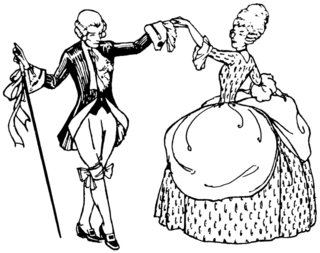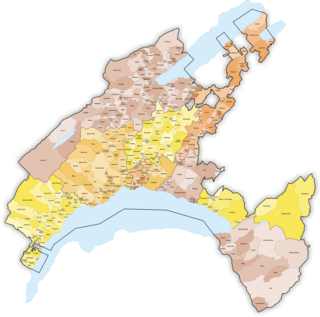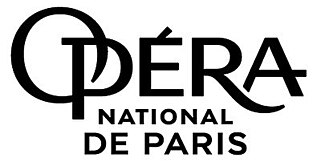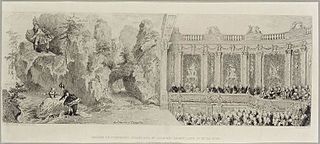
A minuet is a social dance of French origin for two people, usually written in 3
4 time but always played as if in 6
8 to reflect the step pattern of the dance. The English word was adapted from the Italian minuetto and the French menuet.
Jean-Baptiste Lully (1632–1687) was an Italian-born French composer.

There are 300 municipalities in the canton of Vaud, Switzerland,. Vaud is the canton with the 2nd most municipalities.
Lully is a municipality in the Swiss canton of Vaud, located in the district of Morges.

There are 126 municipalities in the canton of Fribourg, Switzerland.

The Paris Opera Ballet is a French ballet company that is an integral part of the Paris Opera. It is the oldest national ballet company, and many European and international ballet companies can trace their origins to it. It is still regarded as one of the four most prominent ballet companies in the world, together with the Bolshoi Ballet in Moscow, the Mariinsky Ballet in Saint Petersburg and the Royal Ballet in London.
In the French courts during the 17th Century, ballet first begins to flourish with the help of several important men: King Louis XIV, Jean-Baptiste Lully, Pierre Beauchamps, and Molière. The combination of different talents and passions of these four men shaped ballet to what it is today.

The Paris Opera is the primary opera and ballet company of France. It was founded in 1669 by Louis XIV as the Académie d'Opéra, and shortly thereafter was placed under the leadership of Jean-Baptiste Lully and officially renamed the Académie Royale de Musique, but continued to be known more simply as the Opéra. Classical ballet as it is known today arose within the Paris Opera as the Paris Opera Ballet and has remained an integral and important part of the company. Currently called the Opéra national de Paris, it mainly produces operas at its modern 2,723-seat theatre Opéra Bastille which opened in 1989, and ballets and some classical operas at the older 1,979-seat Palais Garnier which opened in 1875. Small scale and contemporary works are also staged in the 500-seat Amphitheatre under the Opéra Bastille.
Opéra-ballet is a genre of French Baroque lyric theatre that was most popular during the 18th century, combining elements of opera and ballet, "that grew out of the ballets à entrées of the early seventeenth century". It differed from the more elevated tragédie en musique as practised by Jean-Baptiste Lully in several ways. It contained more dance music than the tragédie, and the plots were not necessarily derived from classical mythology and allowed for the comic elements, which Lully had excluded from the tragédie en musique after Thésée (1675). The opéra-ballet consisted of a prologue followed by a number of self-contained acts, often loosely grouped around a single theme. The individual acts could also be performed independently, in which case they were known as actes de ballet.

Christophe Rousset is a French harpsichordist and conductor, who specializes in the performance of Baroque music on period instruments. He is also a musicologist, particularly of opera and European music of the 17th and 18th centuries and is the founder of the French music ensemble Les Talens Lyriques.

Les Arts Florissants is a Baroque musical ensemble in residence at the Théâtre de Caen in Caen, France. The organization was founded by conductor William Christie in 1979. The ensemble derives its name from the 1685 opera Les Arts florissants by Marc-Antoine Charpentier. The organization consists of a chamber orchestra of period instruments and a small vocal ensemble. Current notable members include soprano Danielle de Niese and tenor Paul Agnew, who has served as assistant conductor since 2007. Jonathan Cohen is also on the conducting staff; Christie remains the organization's artistic director.

Acis et Galatée is an opera by Jean-Baptiste Lully. Unlike most of his operas, which are designated tragédies en musique, Lully called this work a pastorale-héroïque, because it was on a pastoral theme and had only three acts compared to the usual five. Otherwise, there is little musically or dramatically to distinguish it from Lully's tragédies.

Amadis or Amadis de Gaule is a tragédie en musique in a prologue and five acts by Jean-Baptiste Lully to a libretto by Philippe Quinault based on Nicolas Herberay des Essarts' adaptation of Garci Rodríguez de Montalvo's Amadis de Gaula. It was premiered by the Paris Opera at the Théâtre du Palais-Royal sometime from January 15 to 18, 1684. There was a later production at Versailles without scenery or machines in 1685.

Phaëton is a tragédie en musique in a prologue and five acts by Jean-Baptiste Lully. Philippe Quinault wrote the French libretto after a story from Ovid's Metamorphoses. It can be read as an allegorical depiction of the punishment awaiting those mortals who dare to raise themselves as high as the "sun".

French opera is both the art of opera in France and opera in the French language. It is one of Europe's most important operatic traditions, containing works by composers of the stature of Rameau, Berlioz, Gounod, Bizet, Massenet, Debussy, Ravel, Poulenc and Messiaen. Many foreign-born composers have played a part in the French tradition, including Lully, Gluck, Salieri, Cherubini, Spontini, Meyerbeer, Rossini, Donizetti, Verdi and Offenbach.

Lully is a municipality in the district of Broye, in the canton of Fribourg, Switzerland. On 1 January 2006 Lully incorporated the formerly independent municipalities of Bollion and Seiry as a result of boundary changes by the cantonal authorities.

Seiry is a village lying within the municipality of Lully, in the canton of Fribourg, Switzerland. It formerly existed as an autonomous municipality, but on 1 January 2006 was merged with Bollion, into the larger Lully. Seiry first appears in 1180 CE as Seirie. The Historical Dictionary of Switzerland records a population peak of 209 in 1900, steadily dropping to 89 inhabitants in 1970, before rising again to 200 before the merger with Lully.
The French musical ensemble Les Talens Lyriques was created in 1991 in Paris, France, by the harpsichordist and orchestral conductor Christophe Rousset. This instrumental and vocal formation derives its name from the subtitle of Les fêtes d'Hébé (1739) an opera by Jean-Philippe Rameau.

Jean-Baptiste Lully was a French composer, dancer and instrumentalist of Italian birth, who is considered a master of the French Baroque music style. Best known for his operas, he spent most of his life working in the court of Louis XIV of France and became a French subject in 1661. He was a close friend of the playwright Molière, with whom he collaborated on numerous comédie-ballets, including L'Amour médecin, George Dandin ou le Mari confondu, Monsieur de Pourceaugnac, Psyché and his best known work, Le Bourgeois gentilhomme.

Lulism is a political ideology describing the 2006 consolidation of segments of Brazilian society previously hostile to social movements and the Workers' Party behind political forces led by President Luiz Inácio Lula da Silva, appealed by a controlled reformism and limited structural change focused on the poorest sections of society. The lower classes, who had distanced themselves from Lula, accepted his candidacy after his first term as President as the middle class turned from him. The rhetoric and praxis which united the maintenance of stability and state distributism are the origins of Lulism. While advocating socialism, Lulism aims for a 'social liberal' approach that gradually resolves the gap between the rich and the poor in a market-oriented way.




















